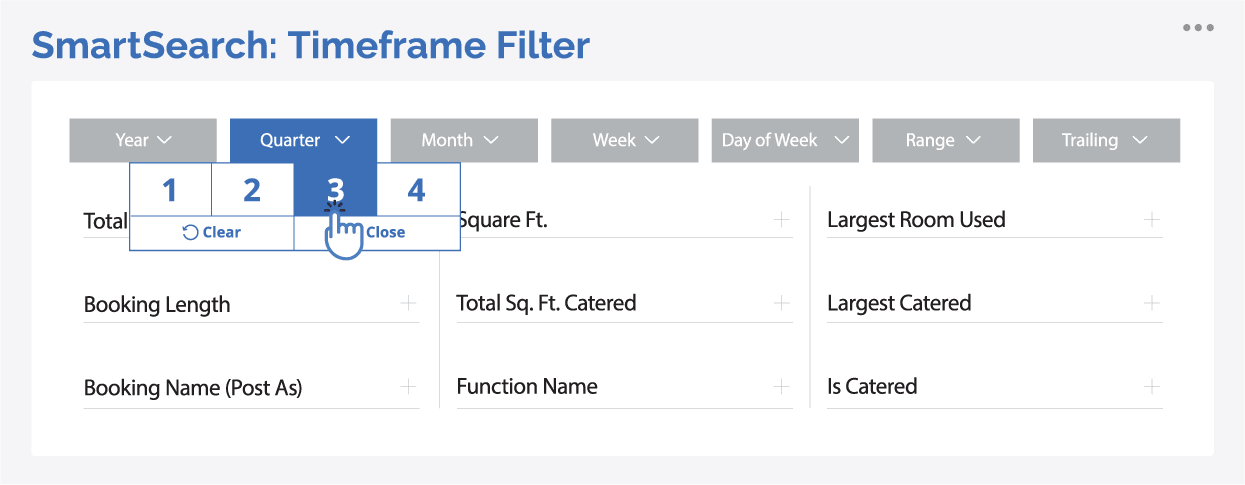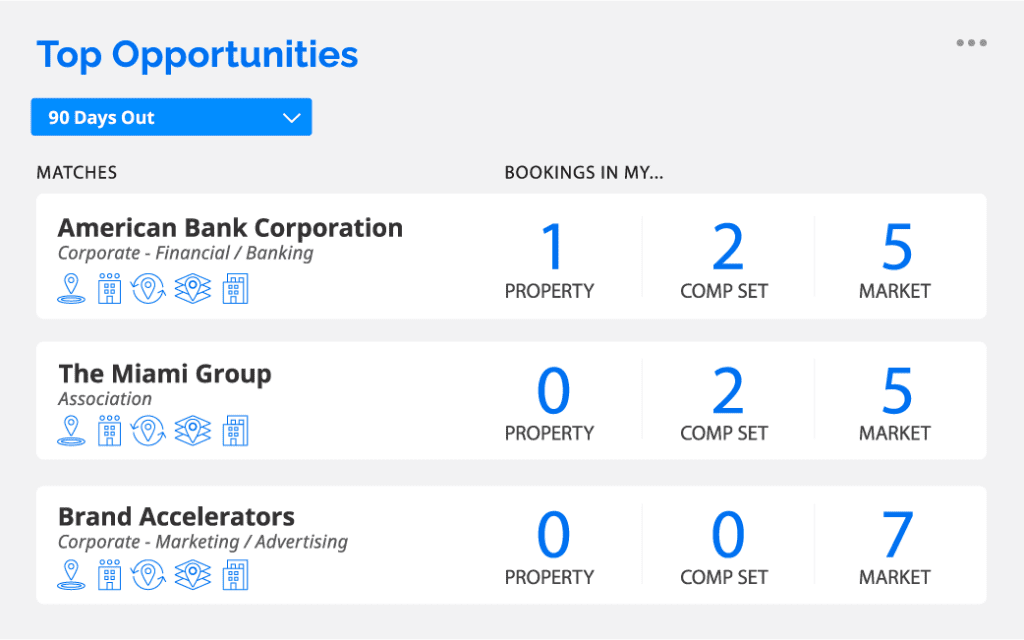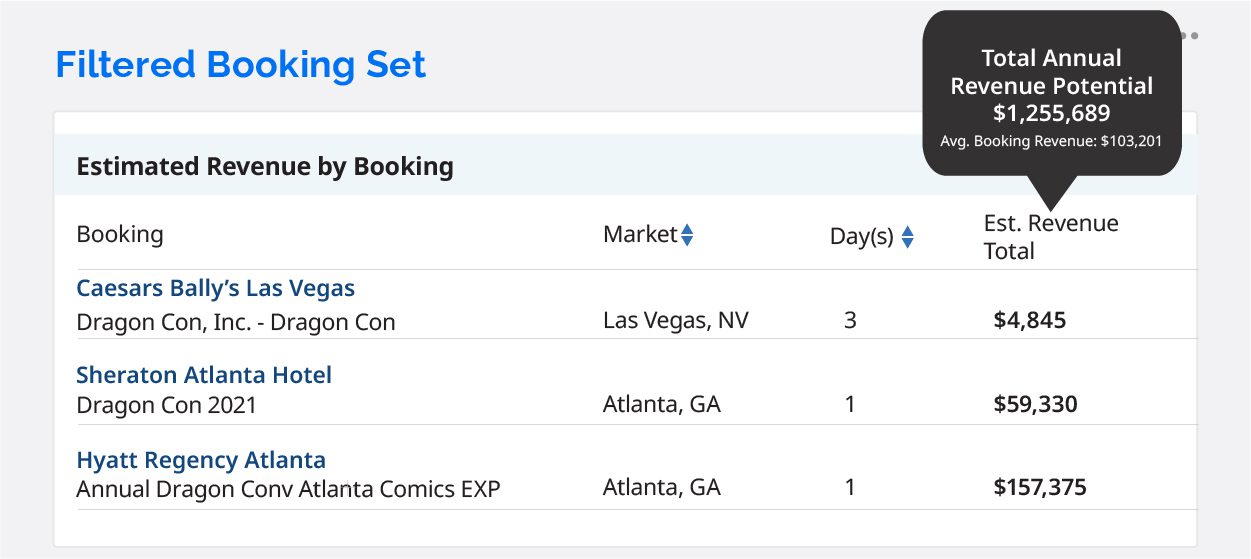In the hotel industry, data analytics is a trending topic – and for good reason! A data-driven strategy keeps hotels agile when it comes to revenue management, marketing, guest relations, and specifically, sales.
Smaller teams, a shifting economy, and market recovery are changing the hotel sales landscape. A recent Knowland survey found that, as of January 2023, only 24% of responding hotels had fully re-staffed sales teams and at least 53% won’t be re-staffing any time soon. Still, rising recovery forecasts translate into high expectations from management, and reps need to facilitate growth in new ways.
Fortunately, a data-driven strategy can help teams compensate for lost personnel and increase sales revenue. When used to drive decision-making, market, and account data can help your sales team stay agile and highly productive at every stage of your sales funnel.
Not Using Data? The Statistics Aren’t in Your Favor
According to Salesforce, successful sales teams are three and a half times more likely to use analytics than struggling teams. They cite data as the leading indicator of a high-performing sales team. The reason is simple— with data as a guide, sales teams get ahead faster. The same applies to the hospitality industry. Your team is statistically less likely to perform if you’re not using analytics
Hotel industry data analytics support tactics like account-based selling, evaluation of inbound requests for proposals, intent-based targeting based on booking behavior, and more.
Each step in the sales process is an opportunity to utilize analytics and discover clients’ booking patterns and preferences. Rather than relying on trial and error, data-driven sales teams turn insights into targeted action plans.

4 Ways to Leverage a Data-Driven Sales Strategy
Hotel data eliminates guesswork and drives intelligent decision-making. Leverage data with these simple steps to see the benefits below.
1. Increase occupancy and revenue during need periods
Hotels automate their tactical sales needs with the right approach. Look at booking patterns to prospect for groups to fill need periods, and target accounts by industry, attendance size, and square footage used.
Targeted need-based selling evens out day-of-the-week gaps in bookings regardless of economic conditions. Although, it’s especially important in periods when corporate transient travel dies down.
How to get started
Step 1: When searching for need-based accounts, consider the following:
- What are your need periods?
- How much space is already booked?
- How many guest rooms can you offer?
- What is your forecasted ADR?
Step 2: With these factors in mind, ask yourself, which of your target accounts truly fulfills your needs? Without a data-driven strategy, you might find out too late when your pipeline is running short.
Step 3: Leverage tools to help you hone in on the right accounts to maximize the probability of booking. Knowland’s SmartSearch reduces time spent on unqualified accounts by identifying the prospects that fit your booking criteria. Try filtering account searches by need periods, industry, days of the week, and preferences.

2. Grow market share with strategic accounts
Data-driven sales teams save time on account-based planning by identifying strategic accounts first. Account data, details, behaviors, and booking history expedite annual, quarterly, and monthly planning. In addition, teams can enhance GSO-managed account penetration by leveraging national activity in local offices.
How to get started
Step 1: Identify local target businesses in your market by mileage radius from your hotel to target for business travel needs or meetings and events. Look at their historical preferences and booking history using dynamic search filters.
Step 2: Look at your Top Opportunities in Knowland to see who is booking with you, your competitors, and your market. Identify those booking locally, but not with you, and compare their preferences to your hotel. Target those that are the best fit and shift them to your property.

3. Personalize your inbound sales strategy
Stop treating each RFP the same. Research inbound leads to ask them the right questions, qualify opportunities, and save time by allocating the right amount of time based on their fit to your property.
Your research can justify the value of an account when competing internally for space, reservations, or holds. For instance, when faced with two RFP options, historical booking patterns for meeting volume and property fit can isolate the most reliable group.
How to get started
Step 1: Consider your ADR and chain scale; are they suited to the requesting group? If you’re unsure, how can you know if you’re effectively using your time?
Step 2: Type the group name from the RFP into the Knowland Search Bar to view the account profile and booking analysis. You’ll find booking history, average budget, meeting specifications, chain scale preferences, and more.
Step 3: Use our Estimated Revenue Calculator to determine the account’s total revenue potential. Prioritize deals that will bring in the most revenue and reduce time spent on unqualified groups.

4. Build stronger client relationships
Behavioral data helps teams personalize communication with potential clients. Knowing what they’re looking for makes it easier to win target accounts. This means asking questions to start meaningful conversations with potential customers.
For example, rather than asking, “Do you have any meetings coming up?” you can lead with a statement such as “I know before COVID you were averaging about seven meetings per year in the Anaheim market. Are you considering what meetings will look like next year?”
There will always be another sales manager asking the wrong questions. With data analysis, you’ll have the advantage at your first “hello”. Approach clients with relevant solutions and personalized offers to win more business.
How to get started
Step 1: Look at your target account’s historical booking patterns and preferences. Compare their preferences with your property. Do they frequent similar markets or hotel brands? What about their square footage requirements?
Step 2: Ask yourself if the account is a match for your property. If you align with their booking patterns and preferences, they may fulfill your needs too. Build a story that differentiates your hotel and be able to explain how you can add value and build the best meeting experience for attendees.
Step 3: Make your intro strong, pick up the phone, and make a connection that closes a deal.
Build a Data-Driven Sales Team with Knowland
Overall, data-driven sales teams are more in control of their results. They’re equipped with vital information that converts the right customers at the right time. When you start using data as part of your sales strategy, you’ll be able to:
- Improve STR Report performance
- Shift market share
- Expedite annual, quarterly, and monthly planning
- Fill need periods
- Increase RFP win rates
- and more!
The next step is choosing a platform with sales-boosting potential! Knowland is a pipeline-generation platform with the largest share of market data available. Boost efficiency, close more deals, and beat your competition with insights for your property. Schedule a platform walkthrough with a hotel data expert to learn more about using a data-driven strategy for need-based selling, account-based planning, and inbound sales.




